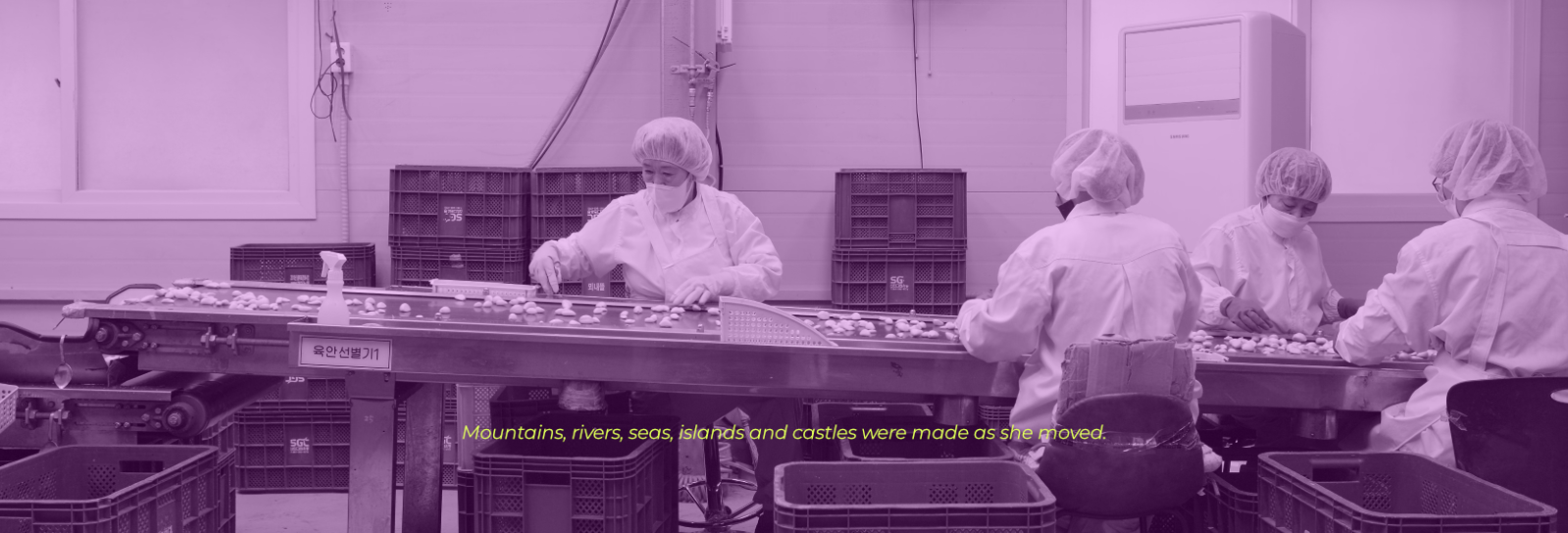Platform - Yujin Jung & Eli Ståhl
Intervals #2: The rhyme of memory and time
In a garlic factory, in a speculative future, the workers share their personal narratives about their mothers. The stories of the workers become intertwined with the Korean cosmogonic myth of Grandmother Mago and the artist’s memory of her own grandmother; a reverberating voice proclaiming “Grandma, I don’t like raw garlic.”
The factory becomes the universe in Yujin Jung’s video- and sound installation "Intervals #2: The rhyme of memory and time"; highlighting the invisible labour that takes place within the factory and centering voices that are otherwise drowned out by patriarchal bourgeoisie and other heavy machinery. Jung uses the technology of a reverberation chamber to echo and layer the voices of the workers, playing with the tension between the unity and individuality of the workers who remain nameless yet become personalised through their sharing of stories and memories. Speaking in overlapping voices, the factory workers embody Mago. The goddess Grandmother Mago created the universe and instructed a bear on how to become the first human through garlic, mugwort and endurance.
One day, a long, long time ago,
a bear and a tiger beseeched a spiritual tree.
They wanted to become something else,
as If they were desperate for a transition.
The transition of the bear into a human queers the work’s relationship to the broader theme of societal and technological change; transcending simplified narratives of deterioration. Planetary transition is indicated in the piece through the essential materials of the world (mugwort and garlic) going nearly extinct. The transition of the world has made time uneven, however, transitioning is an open-ended concept, and the piece is not concerned with apocalypse. "Intervals #2" is rather an investigation of ever-changing worlds that are simultaneously space and non-space, whether this is a factory or the entire universe. It is an analysis of matters of becoming; considering this as an on-going process of transition and transformation.
I entered the main hall,
I greeted all Mago, one by one.
We were here together, to do one last task:
To provide the last garlic to the last generation of our species
before transforming into the unknown.
The piece is a continuation of "Intervals" (2021) which revolved around Korean folklore and traditions concerning death. "Intervals" was shown last year at Afgang (MFA Degree Show) at the Royal Danish Academy of Fine Arts.
Curation and text by Eli Ståhl.
UKS - Unge Kunstneres Samfund/ Young Artists’ Society has supported the exhibition with artist fee and production of the work.
About Yujin Jung
Yujin Jung (b. 1988) is an artist from South Korea, who lives and works in Copenhagen. She holds a BA degree in Fine Art from Goldsmiths College, University of London (2013), and an MA from the Royal Danish Academy of Fine Arts in Copenhagen (2021). Her most recent solo exhibition was Seeders – Intervals (2022) at Cantina, Aarhus. She has participated in the group exhibitions Three sound installations (2020) and Performative Sound Sculptures #2 (2018) at Mayhem, Copenhagen, and contributed with an audio paper to Seismograf: Sounding Women’s Work II (2022).
Jung’s interests lie in folklore, oral history, vernacular knowledge production, and myth, which she integrates with contemporary technology and scientific terminology to reflect on time and history as multi-dimensional. Jung works with diverse forms of sound installations exploring narrative-based experimental sonic-cinema to examine the theoretical, philosophic, poetic aspects of sound and voice within different sonic worlds. By creating distinct modes of storytelling and narration, reinforcing the power of poetry of sonic-visual environments, Jung intends to invite the audience to go beyond the homogenised way of perceiving society: to listen and to think with sound.
About Eli Ståhl
Eli Ståhl has worked in varied positions as curator, producer, and front of house at institutions including the Museum of Contemporary Art (Roskilde, Denmark), IPAF - International Queer Performance Festival (Copenhagen, Denmark), Roskilde Festival (Roskilde, Denmark), and EC1 24H (Copenhagen, Denmark).
Their work is centred around time-based media, including performance, video and sound, and is particularly interested in themes of worker's rights and queerness; topics which they also explore through union work and social organising. They occasionally write for Artillery Magazine (US). Ståhl holds an MA in Contemporary Art Theory from Goldsmiths, University of London, with a dissertation on climate urgencies and planetary transition
and a BA in History of Art from University of Copenhagen.
